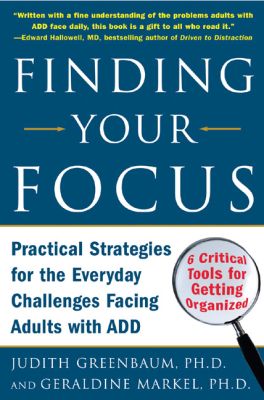Finding Your Focus
Step 1. Download Adobe Digital Editions Both PC and Mac users will need to download Adobe Digital Editions to access their eBook. You can download Adobe Digital Editions at Adobe's website here.
Step 2. Register an Adobe ID if you do not already have one. (This step is optional, but allows you to open the file on multiple devices) Visit account.Adobe.com to register your Adobe account.
Step 3: Authorize Adobe Digital Editions using your Adobe ID. In Adobe Digital Editions, go to the Help menu. Choose “Authorize Computer.”
Step 4: Open your file with Adobe Digital Editions. Once you’ve linked your Adobe Digital Editions with your Adobe ID, you should be able to access your eBook on any device which supports Adobe Digital Editions and is authorized with your ID. If your eBook does not open in Adobe Digital Editions upon download, please contact customer service
Part I Getting to Know Yourself
1 Understanding ADD
Recognizing Symptoms
Getting a Diagnosis: How to Tell If You Have ADD
Some Treatment Options
The Role of Attention
ADD and Organizational Abilities
How This Book Can Help You
2 Identifying Your Strengths and Weaknesses
Identifying Your Strengths
Understanding Your Weaknesses
Distinguishing Between Helpful and Difficult Environments
Identifying Strategies That Work for You
Using Self-Awareness to Prevent Problems
3 Your Personal Tool Box
Important Rules for Using the Tools
Tool 1: Self-Talk
Tool 2: Visualizing
Tool 3: Hearing, Touching, Smelling, Tasting
Tool 4: Routines
Tool 5: Checklists
Tool 6: Stop!
Part II Practical Strategies for Everyday Problems
4 Help, I Can’t Find My Keys!
Why You Keep Losing Things
Preventing Items from Getting Lost
How to Stop Losing Your Keys
How to Stop Losing Your Glasses, Wallet, or Cell Phone
How to Remember Where You Parked Your Car
How to Stop Misplacing Your Money
How to Stop Getting Lost
When Something Is Already Lost: Finding Misplaced Items
Guidelines to Help You Locate Things Without Panicking
5 My House Is a Pigsty!
Barriers to Neatness and Organization
Is All Clutter Bad?
Action Steps to Get Organized
Steps to De-Cluttering and Organizing Your Room
Attacking a Pile of Papers
Organizing Your Kitchen
Tips for Maintaining a (Relatively) Neat Home
6 No Matter How Hard I Try, I’m Always Late
Poor Time Management Can Cause Multiple Problems
Manage Attention to Manage Time
Increase Time-Estimation Skills to Manage Time
The Importance of Planning for Better Time Management
Completing a Grant Proposal on Time
Dealing with Common Time Wasters
Perfectionism
Plan on Improving Slowly
7 I Have Things to Do, but I Don’t Know Where to Begin
Procrastination
Overcoming Procrastination
Planning a Trip
How to Develop Checklists for Complex Tasks
Giving a Dinner Party
Making a Presentation at Work
The Satisfaction of Getting Things Done
8 People Get Irritated with Me and I Don’t Know Why
What Makes Them So Angry
How to Read Cues from Other People
Talk Less
Listen Better
Renegotiate Relationships
Follow Through on Commitments
Work to Become More Self-Aware
Part III Looking Ahead to the Future
9 Medication: Should I? Shouldn’t I?
What Medication Can Do
The Medication Decision
Types of Medication
Monitoring Your Medication
Guidelines for Taking Medication
Strategies for Keeping Track of Your Medication
Reevaluating Medication
10 Making Decisions and Setting Goals
How ADD Affects Decision Making and Goal Setting
Skills Required for Effective Decision Making and Goal Setting
Problem-Solving Checklist
Decision-Making Checklist
Diagrams to Help You Solve Problems and Make Decisions
Setting Goals
Concluding Remarks
Resources
Index
“Filled with tools, strategies, and checklists and written with a fine understanding of the problems adults with ADD face daily. This book is a gift to all who read it.” —Edward Hollowell, M.D., bestselling author of Driven to Distraction
Written by two expert ADD coaches with more than 30 years experience, this practical handbook offers adults with ADD practical techniques for coping with common everyday challenges. These simple proven strategies can help you focus attention, organize your thoughts, and manage time—so you can avoid missing appointments and deadlines, handle social situations, and improve memory skills. A safe alternative to prescription medications, it’s a complete home program that anyone can do.

